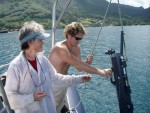The National Science Foundation is funding a microbial biodiversity survey and inventory that will take place across all the major aquatic (marine and freshwater) Long Term Ecological Research (LTER) sites. Known as MIRADA (Microbial Inventory Research Across Diverse Aquatic) LTERs, the biodiversity survey and inventory will take advantage of the aquatic sampling locations that are part of the established LTER network. It will build on existing infrastructure for coordination at the Marine Biological Laboratory (MBL) in Woods Hole, MA, set in place by the Alfred P. Sloan Foundation-supported ocean realm project called the International Census of Marine Microbes (ICoMM).The MBL houses three of the principal investigators from a total of the 13 participating LTERs: John Hobbie (ARC), Chuck Hopkinson (PIE) and Hugh Ducklow (PAL), as well as Mitch Sogin (the lead PI) and Linda Amaral-Zettler, the Secretariat and Education and Outreach lead of ICoMM.
The MIRADA LTERs project will adopt ICoMM's 454-based rDNA tag sequencing strategy that allows extensive sampling of both common and rare microbial species and provides a common metric for integrating studies of microbial diversity across aquatic LTER sites. This strategy will not only enable cross-site comparisons, but also provide valuable baseline data for integrating population structures with ecosystem change, and understanding microbially-mediated trophic dynamics and biogeochemical processes - areas of study already underway at many of the LTERs.
Equally important, the MIRADA project will foster cross-site collaboration between participating LTERs and link into existing outreach efforts established as part of the Schoolyard LTER program. Metrics for charting scientific progress will include
- Production of molecular data for monitoring microbial diversity
- Publication of primary data by the participating LTER partners
- Release of data in a variety of formats for the wider community
These data will enable faculty and students to engage in collaborative projects and provide a mechanism to engage undergraduates and graduates students in working with data generated from an LTER location.
As part of a far-reaching outreach effort, MIRADA will coordinate with interested LTERs to develop podcasts that can be used by schools nationally to promote awareness of the importance of biodiversity maintenance, long-term ecological research and earth's ecosystems. This outreach effort will emphasize the participating LTERs in Polar regions (for International Polar Year 2007/2008) during the first year and will base its progress on success in targeting both economically and culturally diverse K-12 audiences.
The project and its products will be an important precursor to the emerging NEON Integrated Science and Education Plan. Participants will be invited to attend a general meeting and will be eligible for support for training their students in bioinformatics analysis of the resulting data. All DNA obtained from this project will be vouchered in collections at the MBL or the Ocean Genome Legacy. All data resulting from this project will be maintained in the MICROBIS database that serves as ICoMM's central database accessible through the ICoMM website. The data will also be linked to the webpages of individual LTER sites.

 Enlarge this image
Enlarge this image